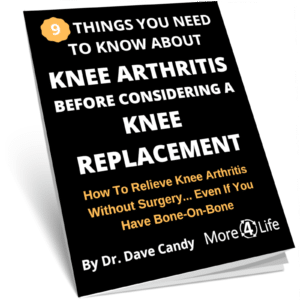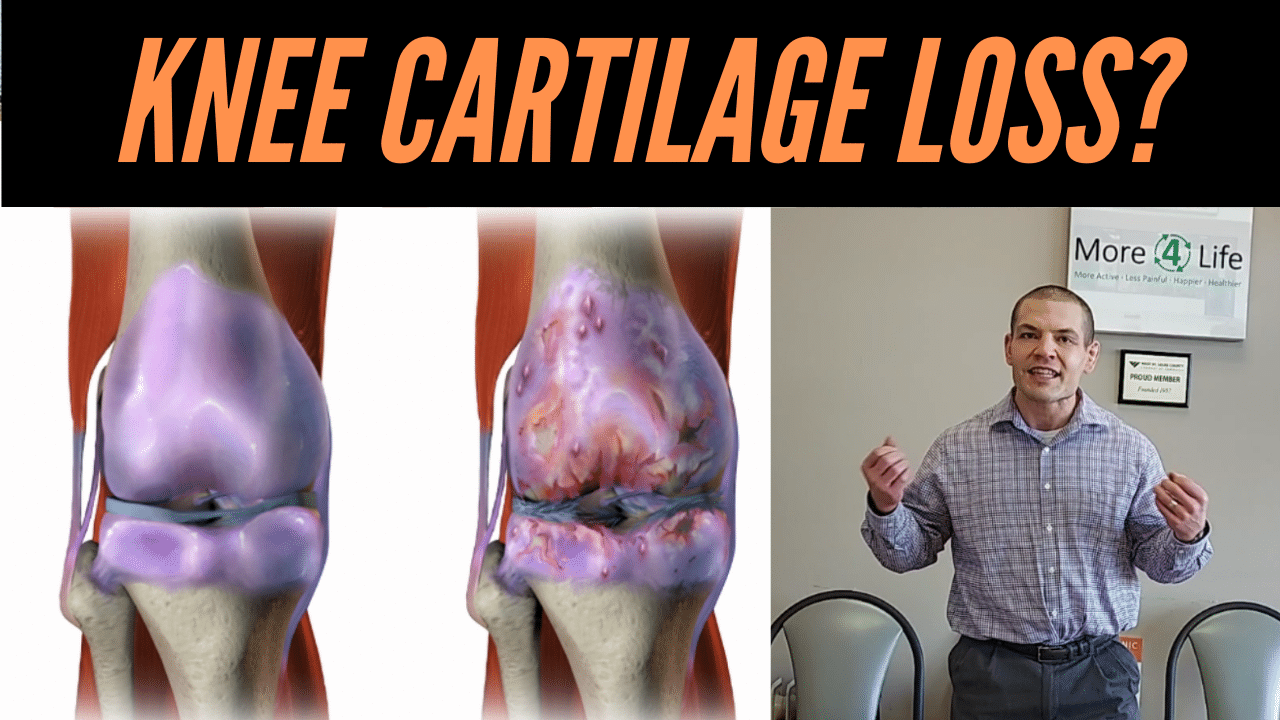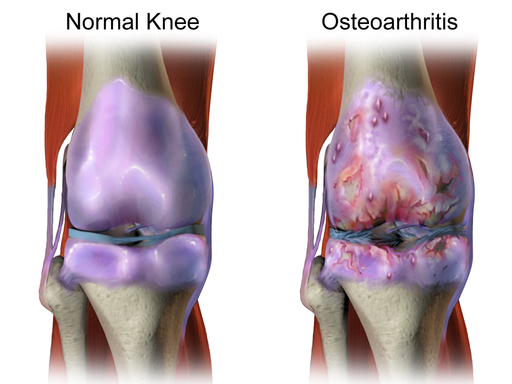Have Knee Cartilage Loss Or An Injury To Knee Cartilage?
Understanding knee cartilage loss can be difficult because there are two different types of cartilage in the knee. Watch the video to learn tips to relieve pain from an injury to knee cartilage without surgery...

What's The Difference Between Knee Cartilage Loss & An Injury To Knee Cartilage?
Many people get confused as to what exactly an injury to knee cartilage is.
Is it arthritis? Is it the meniscus? Is it chondromalacia?
In short, "knee cartilage" can refer to any of the above.
Is The Meniscus Cartilage?
Yes, the meniscus is one type of catilage in your knee.
You actually have 3 different types of cartilage in your body, two of which are your knee.
The 3 Types of Cartilage In Your Body Are:
- Elastic cartilage: your ears and nose
- Fibrocartilage: the meniscus in your knee, the intervertebral discs in your back, and the and articular disc in your TMJ
- Hyaline cartilage (articular cartilage): the cartilage that lines most joints in your body, including your knee joint and your patellofemoral (kneecap) joint
Injury To Knee Cartilage (Meniscus)
Your meniscus is made of fibrocartilage, and lines the knee joint between the tibia (lower leg bone) and femur (thigh bone).
The medial meniscus sits on top of the inner side of the tibia. The lateral meniscus sits on top of the outer side of the meniscus.
These tough, fibrocartialge menisci help protect the softer, smoother hyaline cartilage that lines the joint surface.
The menisci also give the joint more stability and make it more resistant to twisting motions.
However, excessive twisting motions while bearing weight on the leg can cause injury to the fibrocartilage meniscus.
Injuries to the meniscus can cause knee pain, swelling, and clicking or popping deep inside the joint. In extreme cases, a meniscus tear can cause your knee to lock, feel unstable, or even give way completely causing a fall.
Meniscus injuries can also lead to earlier onset of arthritis, or knee cartilage loss, later in life.
Injury To Knee Cartilage (Hyaline Cartilage)
Hyaline cartilage is a smooth, spongy type of cartilage that covers joint surfaces. It provides shock absorption, as well as provides a lubricating fluid to the joint called synovial fluid.
An injury to the hyaline cartilage of the knee can occur from a blunt trauma such a fall on your knee, a twisting injury to the knee, or landing on your feet after falling from a height.
Knee Cartilage Loss (Arthritis)
Knee cartilage loss usually refers to osteoarthritis. Knee cartilage loss can occur as "wear and tear" of the joints over time.
Knee Cartilage Loss Itself Is NOT Painful
As noted above, the hyaline cartilage in the knee releases lubricating fluid (synovial fluid) into the joint when you move. When there is knee cartilage loss, less synovial fluid is released into the joint. This can cause knee stiffness, especially when sitting for long periods of time or after sleeping.
Additionally, when there is less lubricating fluid in the joint, the friction between the joint surfaces can cause inflammation.
Inflammation can then in turn can cause knee pain.
What Causes Knee Cartilage Loss?
Usually there is no specific acute injury that causes knee cartilage loss, but rather gradual micro-injuries over time.
As noted above, injuries to the meniscus or a meniscus surgery can cause knee cartilage loss later in life.
However, just as an acute twisting injury can injure the meniscus and cartilage in the knee, repeated micro-twisting of the knee from overpronating while walking can cause knee cartilage loss over time.
Treatment For Knee Cartilage Damage
Whether knee cartilage is damaged acutely or over time, there are a few things you can do to relieve knee pain and prevent further knee cartilage damage.
Knee Cartilage Repair Without Surgery?
There are some up and coming regenerative medicine treatments that seek to help knee cartilage repair without surgery.
The effectiveness of these treatments is still being investigated, but some of these treatments include:
- PRP injections
- Hyaluronic acid injection
- Stem cell injections
If you're nervous about getting large needles stuck in your joint there are also some supplements that can help with knee cartilage pain.
Supplements For Knee Cartilage Loss
Glucosamine and chondroitin sulfate are the two most heavily studied supplements that deal with joint health. They're most widely studied in people with knee arthritis.
A recent meta-analysis (the highest level of research that combines the results of multiple studies), shows that both glucosamine and chondroitin are beneficial in terms of pain for knee arthritis. However, the two together don't offer any additional benefit to taking either alone.
Methylsulfonylmethane (MSM) is another widely used supplement for knee arthritis. Some studies show that MSM may provide additional benefit to the glucosamine-chondroitin combination, but the jury's still out.
Here's a glucosamine-chondroitin-MSM supplement from a brand that I trust and use personally.
Another supplement that can help knee cartilage loss is Joint Restore Gummies
These gummies combine boswellia (frankinsense) with CBD to help address the inflammation caused by knee cartilage loss.
One study of boswellia showed:
- Improved knee pain and stiffness
- Decreased inflammatory markers
- Greater walking distance
- Improved quality of life
- Increased knee joint space on x-rays
Full spectrum CBD can also help with knee pain, inflammation, and tissue repair.
Disclaimer: While I have had several patients report improvements with these products, I cannot guarantee that these products or any supplement for that matter will help your knee pain.
Here's one thing that I can guarantee though...
If you've been suffering with knee pain for a long time for a long time, and you'd like to get some help for it, click here to request a Free Knee Pain Discovery Visit at our office.
The visit is no cost to you, and if you're not 100% certain that we can help you with your knee pain, then there's no obligation to continue forward with treatment.
Exercise Treatment For Knee Cartilage Loss
Exercise is one of the most studied, most effective treatments for knee arthritis.
Low-impact, weightbearing exercise is the most effective treatment to help knee cartilage loss.
Knee cartilage doesn't have a good blood supply, so when you increase circulation with aerobic activity, you improve blood flow to the knee cartilage.
The compression and distraction when put weight on and take weight off of the knee joint further helps improve circulation to the knee cartilage.
Strengthen Your Hips
Weak hip muscles can cause your knee to twist too much when walking. This in turn can cause pain on the inside or outside of your knee.
Stretch Your Calves
When your calves are too stiff, it causes your feet to pronate and your knees to twist. Click here to learn how to stretch your calves correctly.
Proper Arch Support When Walking
In addition to strengthening your hips and stretching your calves, wearing custom orthotics when walking can help prevent twisting in your knee joint and help protect your knee cartilage.
How Much Exercise For Knee Cartilage Repair?
When you're training for muscle strength, you generally want to do low repetitions (5-12 repetitions) with high resistance.
Muscle endurance training is more in the 15-25 repetition range.
Tendon training is in the 100-200 repetition range.
However, when training for knee cartilage repair, you need in the 1000's of repetitions with very low resistance.
This again usually comes back to low-impact aerobic exercise.
Do I Need A Physical Therapist To Help With Knee Cartilage Loss?
In theory, no.
If you're walking regularly and correctly then you probably don't need to see a physical therapist to help with knee cartilage loss.
However, you may need a physical therapist if:
- Your knee pain keeps you from walking more than a mile (remember, 1000's of steps)
- You overpronate (flatten your feet) when walking
- You've tried exercising on your own and you're still having knee pain
- You've been told you have knee cartilage loss or are "bone-on-bone" and you don't want to have a knee replacement.
Need Some Help For Knee Arthritis?
Talk to one of our specialist physical therapists to learn how we can help
(even if you've tried physical therapy before and is hasn't worked)





